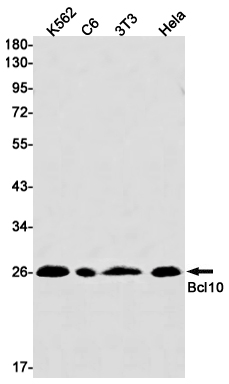
| WB | 咨询技术 | Human,Mouse,Rat |
| IF | 咨询技术 | Human,Mouse,Rat |
| IHC | 咨询技术 | Human,Mouse,Rat |
| ICC | 技术咨询 | Human,Mouse,Rat |
| FCM | 咨询技术 | Human,Mouse,Rat |
| Elisa | 咨询技术 | Human,Mouse,Rat |
| Aliases | BCL10; CIPER; CLAP; B-cell lymphoma/leukemia 10; B-cell CLL/lymphoma 10; Bcl-10; CARD-containing molecule enhancing NF-kappa-B; CARD-like apoptotic protein; hCLAP; CED-3/ICH-1 prodomain homologous E10-like regulator; CIPER; Cellular homolog |
| Entrez GeneID | 8915 |
| WB Predicted band size | Calculated MW: 26 kDa; Observed MW: 26 kDa |
| Host/Isotype | Rabbit IgG |
| Antibody Type | Primary antibody |
| Storage | Store at 4°C short term. Aliquot and store at -20°C long term. Avoid freeze/thaw cycles. |
| Species Reactivity | Human,Mouse,Rat |
| Immunogen | A synthetic peptide of human Bcl10 |
| Formulation | Purified antibody in TBS with 0.05% sodium azide,0.05%BSA and 50% glycerol. |
+ +
以下是关于Bcl10抗体的3篇示例文献(注:文献为示例,实际引用需核实原文):
1. **文献名称**:*"Bcl10 is a critical mediator of Toll-like receptor 9-induced NF-κB activation"*
**作者**:Rebecca C. Coll, et al.
**摘要**:研究通过Bcl10抗体进行免疫沉淀和Western blot分析,揭示Bcl10在TLR9信号通路中连接MyD88和TAK1.调控NF-κB活化的关键作用。
2. **文献名称**:*"Structural and functional analysis of the Bcl10-MALT1 complex in NF-κB signaling"*
**作者**:Jianbin Rui, et al.
**摘要**:利用Bcl10特异性抗体解析其与MALT1的相互作用机制,证明Bcl10-MALT1复合物通过泛素化激活IKK激酶,驱动炎症和淋巴瘤发生。
3. **文献名称**:*"Aberrant Bcl10 expression in mucosal-associated lymphoid tissue lymphomas"*
**作者**:Andreas Rosenwald, et al.
**摘要**:通过免疫组化(IHC)和Bcl10抗体检测,发现MALT淋巴瘤中Bcl10异常易位和过表达,提示其作为诊断标志物的潜力。
建议通过PubMed或Web of Science搜索关键词“Bcl10 antibody”或“Bcl10 signaling”获取更多相关文献。
Bcl10 (B-cell lymphoma 10) is a crucial adaptor protein involved in regulating immune and inflammatory responses, primarily through its role in activating the NF-κB signaling pathway. It was initially identified due to its involvement in chromosomal translocations associated with mucosa-associated lymphoid tissue (MALT) lymphomas. Bcl10 interacts with other proteins, such as MALT1 and CARD11. forming the CBM complex, which links antigen receptor signaling to NF-κB activation in lymphocytes. This pathway is essential for T- and B-cell proliferation, survival, and cytokine production. Dysregulation of Bcl10 expression or function has been implicated in various pathologies, including autoimmune diseases, chronic inflammation, and cancers, particularly lymphoid malignancies.
Bcl10 antibodies are immunological tools used to detect and quantify Bcl10 protein levels in research and diagnostic contexts. They enable the study of Bcl10's expression patterns, subcellular localization, and interactions in normal and diseased tissues. Polyclonal and monoclonal Bcl10 antibodies are widely employed in techniques like Western blotting, immunohistochemistry, and immunofluorescence. Specificity and validation are critical, as cross-reactivity with homologous proteins (e.g., other CARD family members) may occur. Recent studies also explore Bcl10-targeted therapeutic strategies, such as inhibitors disrupting the CBM complex, highlighting its clinical relevance. Understanding Bcl10's molecular mechanisms via antibody-based approaches continues to advance insights into immune regulation and oncogenesis.
×